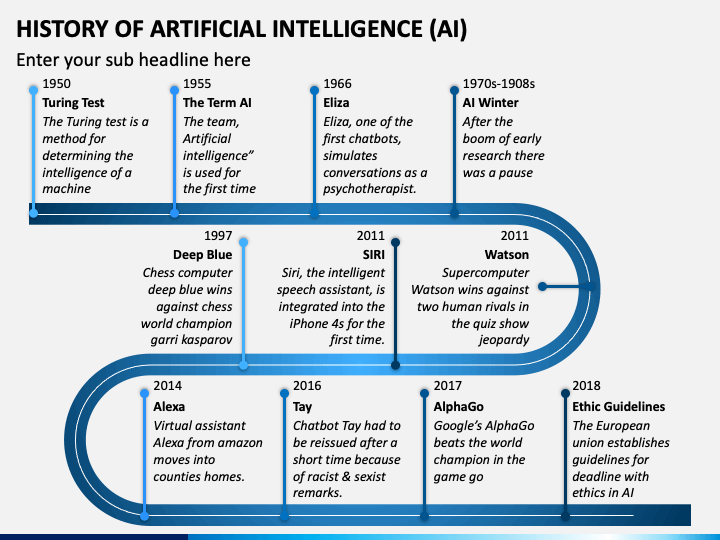History of AI (Artificial Intelligence)
https://www.sketchbubble.com/en/presentation-history-of-artificial-intelligence.html
Brief History of Artificial Intelligence: from Turing to Chat GPT
AI has a rich history that stretches back to the mid-20th century, when pioneers like Alan Turing, John McCarthy, Marvin Minsky, and Claude Shannon began exploring foundational concepts like artificial neural networks, machine learning, and symbolic reasoning. Over the years, AI research has gone through periods of waxing and waning, including the AI winter of the 1970s and 1980s, and the subsequent revival of machine learning algorithms in the 1990s. In recent years, deep learning algorithms have enabled computers to process and interpret complex data, leading to breakthroughs in fields like natural language processing and computer vision. The EU has also recognized the importance of ethics in AI and established a deadline of 2024 for companies to comply with new AI regulations. In 2022, the release of ChatGPT, a large language model trained by OpenAI, demonstrated the enormous potential of AI for transforming the way we communicate and interact with machines. In the years to come many models like the ones trained by OpenAI are going to find themselves integrated into more and more systems such as word processing software, search engines and many more.
Where to Read about the History of AI
- A Brief History of Artificial Intelligence: On the Past, Present, and Future of Artificial IntelligenceHaenlein, Michael, and Andreas Kaplan. “A Brief History of Artificial Intelligence: On the Past, Present, and Future of Artificial Intelligence.” California Management Review, vol. 61, no. 4, 2019, pp. 5–14, https://doi.org/10.1177/0008125619864925.
- Artificial Intelligence and LabourHilstob, Kayla, and Alicia Massie. “Artificial Intelligence and Labour.” Labour / Le Travail, vol. 90, 2022, pp. 223–53, https://doi.org/10.52975/llt.2022v90.009.
- Artificial intelligence by any other name: a brief history of the conceptualization of “trustworthy artificial intelligence”Stix, Charlotte. “Artificial Intelligence by Any Other Name: a Brief History of the Conceptualization of ‘trustworthy Artificial Intelligence.’” Discover Artificial Intelligence, vol. 2, no. 1, 2022, pp. 26–13, https://doi.org/10.1007/s44163-022-00041-5.
- Artificial Intelligence in Healthcare: Past, Present and FutureJiang, Fei, et al. “Artificial Intelligence in Healthcare: Past, Present and Future.” Stroke and Vascular Neurology, vol. 2, no. 4, 2017, pp. 230–43, https://doi.org/10.1136/svn-2017-000101.
- From So Simple a Beginning: Species of Artificial Intelligence.Shadbolt, Nigel. “From So Simple a Beginning: Species of Artificial Intelligence.” Daedalus (Cambridge, Mass.), vol. 151, no. 2, 2022, pp. 28–42, https://doi.org/10.1162/daed_a_01898.
- The brief history of artificial intelligence: The world has changed fast – what might be next?Roser, Max. “The Brief History of Artificial Intelligence: The World Has Changed Fast – What Might Be Next?” Our World in Data, Dec. 2023. ourworldindata.org, https://ourworldindata.org/brief-history-of-ai.
- What to know about OpenAI, the company behind ChatGPTVerma, Pranshu. “What to Know about OpenAI, the Company behind ChatGPT.” Washington Post, 6 Feb. 2023, https://www.washingtonpost.com/technology/2023/02/06/what-is-openai-chatgpt/.
AI in Health by
Call Number: EBookISBN: 9780367333713Publication Date: 2020-02-13We are in the early stages of the next big platform shift in healthcare computing. Fueled by Artificial Intelligence (AI) and the Cloud, this shift is already transforming the way health and medical services are provided. As the industry transitions from static digital repositories to intelligent systems, there will be winners and losers in the race to innovate and automate the provision of services.AI Narratives by
Call Number: EBookISBN: 9780198846666Publication Date: 2020-05-05This book is the first to examine the history of imaginative thinking about intelligent machines. As real Artificial Intelligence (AI) begins to touch on all aspects of our lives, this long narrative history shapes how the technology is developed, deployed and regulated. It is therefore a crucial social and ethical issue.Digital Roots by
Call Number: EBookISBN: 3110739887Publication Date: 2021-09-07As media environments and communication practices evolve over time, so do theoretical concepts. This book analyzes some of the most well-known and fiercely discussed concepts of the digital age from a historical perspective, showing how many of them have pre-digital roots and how they have changed and still are constantly changing in the digital era.Making AI Intelligible by
Call Number: EBookISBN: 9780192894724Publication Date: 2021-06-22Can humans and artificial intelligences share concepts and communicate? Making AI Intelligible shows that philosophical work on the metaphysics of meaning can help answer these questions. Herman Cappelen and Josh Dever use the externalist tradition in philosophy to create models of how AIs and humans can understand each other. In doing so, they illustrate ways in which that philosophical tradition can be improved.The Road to General Intelligence by
Call Number: EBookISBN: 3031080203Publication Date: 2022In this book, we argue that the framework of machine learning is fundamentally at odds with any reasonable notion of intelligence and that essential insights from previous decades of AI research are being forgotten. We claim that a fundamental change in perspective is required, mirroring that which took place in the philosophy of science in the mid 20th century. We propose a framework for General Intelligence, together with a reference architecture that emphasizes the need for anytime bounded rationality and a situated denotational semantics.

